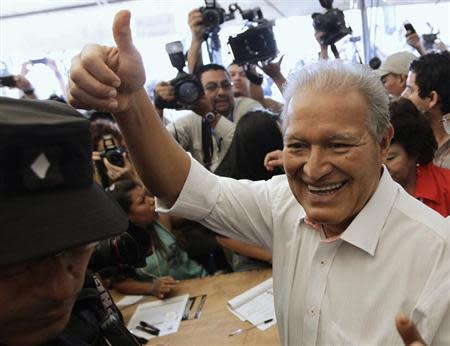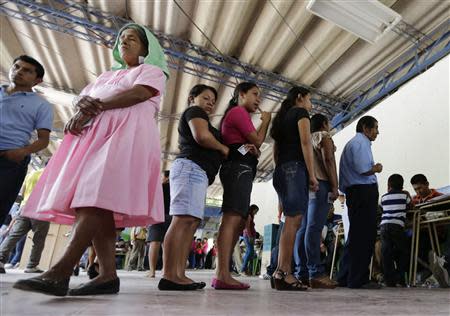El Salvador election fight looms as ex-rebel claims narrow win
By Nelson Renteria and Michael O'Boyle SAN SALVADOR (Reuters) - A former Marxist guerrilla leader and his right-wing rival both claimed victory in El Salvador's presidential election after results showed just a tiny margin between the two. Salvador Sanchez Ceren of the ruling Farabundo Marti National Liberation Front (FMLN), which as a rebel group fought a string of U.S.-backed governments in the 1980-92 civil war, won 50.11 percent support in Sunday's election, preliminary results showed. Challenger Norman Quijano, the 67-year-old former mayor of San Salvador and candidate of the right-wing Nationalist Republican Alliance (Arena) party, had 49.89 percent support. He claimed fraud and insisted he was the real winner. Just 6,634 votes separated them, raising the prospect of legal challenges to the result and a weak mandate for the eventual winner. The FMLN and Arena - founded by the late Roberto D'Aubuisson, a reputed death squad leader - were fierce enemies during the civil war that killed about 75,000 people. El Salvador remains polarized between left and right so Quijano's claim that he won the election immediately raised tensions. He accused the election tribunal of corruption and hinted at foul play. "We are not going to allow fraud...We are 100 percent convinced that we have won," he said. "They are not going to steal this victory. We will fight, if necessary with our lives." The election authority earlier said Sanchez Ceren's lead was undisputable but did not formally declare him the winner, saying it needed to review challenges to some ballots and was waiting for a definitive vote count. Sanchez Ceren claimed victory after the preliminary results showed him winning and he promised to govern for workers and business leaders alike. "We are going to govern for everyone, for those who voted for us, and those who did not," Sanchez Ceren told supporters. Sanchez Ceren won 49 percent of the vote in the first round of voting last month, 10 percentage points more than Quijano and just shy of the majority needed to avoid a run-off. He had been the clear favorite to win heading into Sunday's vote. The tight vote will force the eventual winner to tread a more moderate line, said Javier Oliva, a political scientist at the National Autonomous University of Mexico, particularly with congressional elections due in 2015. "They will have to be more prudent," he said. "It could provide significant stability in institutional terms." VENEZUELA THREAT Quijano picked up support from moderate conservatives in the last month by portraying Sanchez Ceren as a communist with blood on his hands who would veer hard to the left and impose radical policies. After initially campaigning on a proposal to use the army to fight street gangs, or maras, Quijano changed strategy after the first round and instead warned that Sanchez Ceren would follow the path of Venezuela's socialist government, which has taken over private businesses. "He has promised he will clean up the maras, create jobs and will not allow others to send El Salvador down the road of Venezuela," said Marina Perez, a housewife who voted for Quijano on Sunday after backing another conservative contender in the first round. A carpenter's ninth son, Sanchez Ceren was a rural school teacher before joining the FMLN guerrilla movement and he then rose to lead one of its five main factions during the war. Along with other FMLN leaders, he has moderated his policies since the peace accords were signed in 1992 and the rebel group became a political party. If confirmed, Sanchez Ceren's victory gives the FMLN a second consecutive term. The affable, media-shy 69-year-old has said he will build on its social programs, which include a glass of milk a day for children and free school uniforms, shoes and supplies. In a country where a third of people live in poverty and many rely on money sent by relatives living in the United States, the FMLN's social programs are popular. The party first took the presidency at the last election in 2009 when Mauricio Funes, a prominent journalist who had no role in the war, ran as its candidate. Under the FMLN, the government says the poverty rate has fallen from 40 percent to 29 percent. Its welfare policies have, however, contributed to a sharp rise in the country's debt, and economic growth has been weak. (Additional reporting by Noe Torres in San Salvador and Dave Graham, Miguel Gutierrez, Alexandra Alper and Julia Symmes Cobb, Writing by Simon Gardner, Editing by Kieran Murray and Angus MacSwan)





